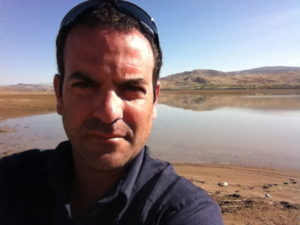By Carlos Antaramian
Special to the Mirror-Spectator
On October 14 of this year in Astana, the capital of Kazakhstan, Turkish President Recep Tayyip Erdogan surprisingly approved Russian President Vladimir Putin’s project to create a Turkish-Russian gas hub in his country. The proposed site is Thrace, in Turkey’s European region, where infrastructure for both gas storage and pipelines already exists. Although details on the costs, deadlines, scope, and conditions for implementing the proposal have not been released, the project has already generated criticism and is widely perceived, especially by the United States, to constitute a threat to several countries. French president Macron, for example, said that the project “made no sense” (“L’Elysée estime que le ‘hub gazier’ proposé par la Russie en Turquie n’a ‘aucun sens’,” https://francais.rt.com/international/101737-elysee-estime-que-hub-gazier-propose-russie-turquie-aucun-sens). On October 19, Vedant Patel, spokesperson for the US State Department, made a highly critical announcement, stating that “Turkey and other U.S. allies will not become a safe haven for illicit Russian assets or transactions,” adding that Washington is willing “to assist (Turkey) in its efforts to enhance its long-term energy security.”
Supplying energy is a critical and controversial issue in global politics, one that creates problems between producing and exporting countries, as we have seen recently in the case of Russian supplies of gas and oil to Europe, a commerce impacted by sanctions due to the war in the Ukraine, including measures to cut planned supplies, restrict gas sales, and place limits on sales of oil (as proposed recently by the G7 at US $60/barrel), and destabilized by “shadowy” attacks on pipelines. It is clear that producers are fighting fiercely for market share and will exploit any opportunity to “gain” ground from their rivals. It is important to note that in June of this year the US, for the first time in its history, supplied more liquid natural gas (LNG) to Europe than its main competitor, Russia through its pipelines, a feat that would have been unimaginable just two or three years ago (Dustin Meyer, “U.S. LNG Outpaces Russia for First Time Ever as EU Opens Another Door for Natural Gas,” American Petroleum Institute, at: https://www.api.org/news-policy-and-issues/blog/2022/07/08/us-lng-outpaces-russia-for-first-time-ever). However, that supply chain is still very costly since middlemen push up the price of the gas that leaves the US fourfold before it arrives in Europe, with an impact that has provoked complaints by European leaders, voiced, for example, by French president Emmanuel Macron (América Hernández, “Why cheap US gas costs a fortune in Europe,” at: https://www.politico.eu/article/cheap-us-gas-cost-fortune-europe-russia-ukraine-energy/). Gas supplies, moreover, cause problems between producers and exporters when pipelines pass through third countries, like Turkey.
Energy is Turkey’s Achilles’ heel, states William Hale. Its principal problem “is that it has limited domestic supplies of fossil fuels, and that other sources have not been fully developed, so it is heavily dependent on imports, which account for about 70 per cent of energy consumption” (William Hale, “Turkey’s energy dilemmas: changes and challenges,” Middle Eastern Studies, Vol. 58, Nº 3, 2022:453). There is very little oil there (barely enough to satisfy 5.75% of the nation’s needs) and only small reserves of hard coal. Turkey has lignite, but that fuel is highly contaminating. Virtually all natural gas is imported, though a field (Sakarya) discovered in the Black Sea could begin production in 2023. Today, Turkey has no nuclear energy, but two construction projects are underway to supply hydroelectric plants (Hale: 457). One result of this situation is that a large portion of the country’s commercial deficit is due to fuel imports (mainly coal, oil, and natural gas), so reducing their volume would go a long way toward mitigating one of its most persistent, serious economic problems.
Over the past two decades, natural gas has become one of the most reliable sources of imported fuel in Turkey. Ankara enjoys the enormous advantage of being a neighbor to three key gas-producing countries: Russia, Iran, and Azerbaijan. Before 2001, Turkey’s only supplier was Russia, through the pipeline that entered Europe from the east (through Ukraine), but since then a pipeline was constructed that connects Tabriz with Ankara, allowing Turkey to access gas from Iran and Turkmenistan. Later, two pipelines were built from Russia, the “Blue Stream” (2003) that crosses the Black Sea from the east (read Ukraine) to avoid traversing Europe, and the “Turkstream” (2020) that crosses the Black Sea and extends to Kiyikoy, in the Turkish region of Thrace, and from there to Greece. Azerbaijan, meanwhile, has the Southern Gas Corridor that begins in the fields of Shah Deniz and reaches Italy through three sections: first, the South Caucasus Pipeline from Baku, passing through Georgia, to Erzurum, inaugurated in 2006; second, TANAP (Trans-Anatolia Pipeline) that stretches from Erzurum to Ankara and then to the Turkey-Greece border; and, third, TAP (Trans-Adriatic Pipeline), from the Turkey-Greece border across the Adriatic to southern Italy, where it connects to the Italian supply network. That project, conceived to reduce European dependence on Russian gas, was completed in 2020 with U.S. support.









